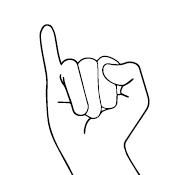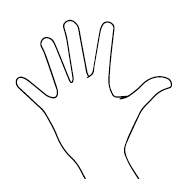TSL | Taiwan Sing Language Gleaning
V/N++:Repetition of Verbs and Nouns
Repetition of verbs:Successive occurrence of the same verb indicates that the action described takes place repeatedly or continuously. The exact meaning is determined by the direction and tempo of the motion. Here are some examples:Indicating continuity or high frequency (an action engaged by the subject multiple times). The exact meaning is determined by the direction:Motion repeated at the same direction/different direction.Give++: to give repeatedly/ to give to multiple individuals. Drop bombs++: to drop bombs repeatedly/to drop bombs at multiple locations Put++: put something up there repeatedly/put something at multiple locations Bomb++: to bomb continuously/to bomb at multiple locations Sell++: to sell something continuously/ to sell something to multiple individuals Indicating that the action is engaged by multiple individuals (more than one subject):
People show up: many people show up/ people show up continuously Indicating that the action takes place regularly or frequently (fixed direction, fixed subject and object): Give me money++: give me money (every month) Payment by installment++: paying loans (regularly) People come and leave++: (he) often comes Repetition of nouns: Stressing: 16++, no++ Indicating plural: Area/location++ = nearby, everywhere There++ = everywhere Year++ = multiple years Wrinkle++ = many wrinkles Seven days++/one week++ = weekly One month++ = monthly Year++ = yearly Repetition of the same sign to indicate the name of a place: Dou (Beans)++ = Madou (a town in Taiwan) Bei (North) = Taipei (Translator’s note: 北 is pronounced with a voiceless unaspirated stop /p/, but modern romanization of Mandarin uses “b” for /p/ and “p” for /ph/. The word Taipei was created using the old system, hence the difference in spelling.) Repetition of adjectives Indicating that multiple entities possess the same quality or are in the same condition: malfunctioning++:Many things are not working. Empty++:There is nobody (at a certain location)/ It’s empty.
Example sentence
- She doesn't like to stay at home. I usually stay at home, taking care of our business. But she likes to go out and talk to our neighbors. She has nothing to do at home, so I let her do what she wants.
- My children (sons or daughters) are awesome. To my satisfaction, they have finished their PhD and respect their father (me).
- Boy or girl? My oldest daughter? Hmmm… She asked Lao Wang to teach me Tai-Chi. Yes, my oldest daughter asked him. Yes, he still remembers so many things. He has a good memory.
- I graduated from the elementary school when I was about 16 or 17. I began my apprenticeship at that time. In the beginning, I had to learn from the master and be responsible for cleaning. After 3 years, I finally started to learn how to make leather shoes. After another 3 years, I finally learned most of the things that I needed to know. At that time, I was about 22 years old.
- I hadn't finished my apprenticeship until I was 22. I had been an apprentice for 6 years. After that, I started to have my own business. I didn't get paid as an apprentice, but the shop owner provided us lunch and dinner. What I did every day was to learn and practice, such as nailing shoe heels, sewing shoe uppers and fixing shoes. I spent 3 years on making shoe uppers and spent another 3 years on attaching shoe soles. In total, I spent 6 years over there and then I left.










































































































